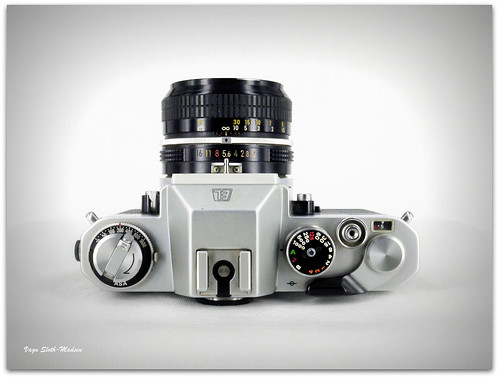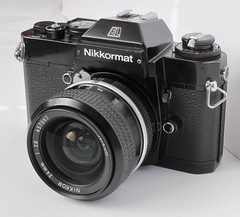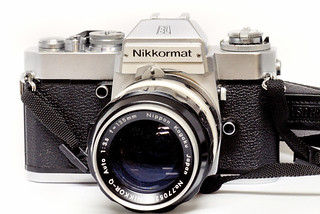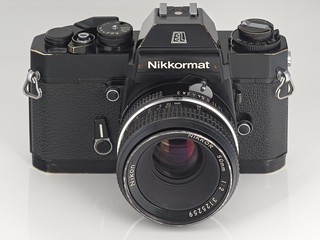Difference between revisions of "Nikomat/Nikkormat EL/ELW"
(Clarifying the ELW's non-obvious on switches; adding some missing words.) |
(noting the invisible W) |
||
| Line 11: | Line 11: | ||
The camera is decidedly weighty compared to its peers of the era, and is considered a tech's nightmare, due to the wiring of the electronics. | The camera is decidedly weighty compared to its peers of the era, and is considered a tech's nightmare, due to the wiring of the electronics. | ||
| − | The '''Nikomat ELW''' (in Japan) or '''Nikkormat ELW''' (elsewhere) was introduced in 1975. This is a black version of EL, adding | + | The '''Nikomat ELW''' (in Japan) or '''Nikkormat ELW''' (elsewhere) was introduced in 1975. This is a black version of the EL, adding connections for the AW-1 autowinder. "W" is not added to the "EL" pentaprism badge, it is only present as a prefix to the serial number. As the winder takes over from the manual film-advance lever, a collar around the shutter release offers a duplicate "on" switch for the electronics. The shutter release is only mechanically locked when both switches are off, i.e. neither red dot showing. |
==Links== | ==Links== | ||
Revision as of 14:24, 1 March 2022

|
| 1/1000 to 4 seconds plus "A" image by Vagn Sloth-Madsen (Image rights) |
The Nikon Nikomat EL (in Japan) or Nikkormat EL (elsewhere) was introduced in 1972. It was one of Nikon's first attempts at producing a camera with electronics. It features an electronically-controlled shutter from 4 seconds to 1/1000. Its center-weighted CdS meter cell enables aperture-priority automatic exposure, using non-AI lenses. Electronic flash sync is at speeds up to 1/125th second. Power is provided by a PX28 6.2 volt silver-oxide battery, inserted into a chamber inside the mirror box. The shutter and metering are disabled to conserve battery power until the film-advance lever is pulled outwards, uncovering a red dot.
The camera is decidedly weighty compared to its peers of the era, and is considered a tech's nightmare, due to the wiring of the electronics.
The Nikomat ELW (in Japan) or Nikkormat ELW (elsewhere) was introduced in 1975. This is a black version of the EL, adding connections for the AW-1 autowinder. "W" is not added to the "EL" pentaprism badge, it is only present as a prefix to the serial number. As the winder takes over from the manual film-advance lever, a collar around the shutter release offers a duplicate "on" switch for the electronics. The shutter release is only mechanically locked when both switches are off, i.e. neither red dot showing.
Links
- Nikkormat EL user manual at Butkus.org
- Nikkormat ELW user manual at Butkus.org
- Nikomat EL at Nikon's History & Technology site
- Nikomat ELW and Nikon EL2 at Nikon's History & Technology site
- First of a series of pages on the Nikkormat EL at the Nikkormat site within "A Pictorial History of Nikon Cameras"
- First of a series of pages on the Nikkormat ELW at the Nikkormat site within "A Pictorial History of Nikon Cameras"
|
|
|
| Nikon 35mm SLR Cameras | |
|---|---|
| Nikkorex F | Nikon EL2 | Nikon EM | Nikon F | Nikon F2 | Nikon F3 | Nikon F4 | Nikon F5 | Nikon F6 | Nikon F50 | Nikon F55 | Nikon F60 | Nikon F65 | Nikon F70 | Nikon F75 | Nikon F80 | Nikon F90 | Nikon F90X | Nikon F100 | Nikon F-301 | Nikon F-401 | Nikon F-401S | Nikon F-401X | Nikon F-501 | Nikon F-601 | Nikon F-601M | Nikon F-801 | Nikon F-801s | Nikon FA | Nikon FE | Nikon FE2 | Nikon FE10 | Nikon FG | Nikon FG-20 | Nikon FM | Nikon FM2 | Nikon FM2n | Nikon FM3A | Nikon FM10 | |
| Nikomat / Nikkormat | |
| EL | EL2 | ELW | FS | FT | FT2 | FT3 | FTN | |


